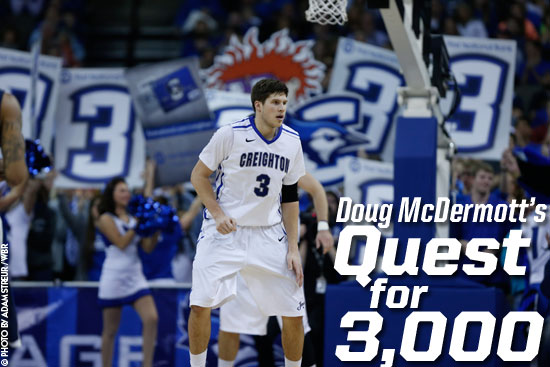“With this group of guys, our fans have six more chances to see them. That’s it. That’s tough for people to think about. They’ve only got six more times with Grant and Doug and Ethan and Jahenns. Our fans have six more times to watch them play. It’s a group that ten years from now, twenty years from now, people are going to talk about.” -Coach Greg McDermott
Doug McDermott’s senior campaign is now officially more than halfway over, and with only six home games remaining in the 2013-14 season, that means there’s only six more chances for most Creighton fans to watch the maestro in person. It’s a bittersweet thought, because while there’s a dwindling number of chances to witness something magical, there’s also a very real possibility that we’re about to witness history.
After scoring 35 against Xavier and 28 against Butler, Doug finds himself in 25th place on the NCAA’s all-time scoring list with 2,644 points. That’s pretty astonishing, but it got us to thinking: where might he end up? What would it take to eclipse the 3,000 point plateau that only seven players in the history of college basketball have achieved?
Entering this weekend’s action, Doug is averaging 25.2 points per game. For the sake of argument, let’s assume Creighton has 17 more games this season (13 remaining conference games, two games in the Big East tourney and two NCAA tourney games). If he scores roughly his average the rest of the season that will put him at 3,066 career points, or exactly tied for fifth place in the history of college basketball with Texas Southern’s Harry Kelly, who scored 3,066 points between 1979-1983. Scoring exactly his average of 25.2 puts him at 3,072 points, good for fifth place by himself.
Think that seems unreasonable? He only needs to average 20.9 points a game to get to an even 3,000, and while nothing is a sure-thing, Doug scoring 21 points per game the rest of the way is about the closest to a sure-thing in college hoops this year.
| Rank | Name | School | Years | Points |
|---|---|---|---|---|
| 1 | Pete Maravich | LSU | 1967-70 | 3,667 |
| 2 | Freeman Williams | Portland State | 1974-78 | 3,249 |
| 3 | Lionel Simmons | LaSalle | 1986-90 | 3,217 |
| 4 | Alphonso Ford | Miss. Valley State | 1989-93 | 3,165 |
| 5 | Harry Kelly | Texas Southern | 1979-83 | 3,066 |
| 6 | Keydren Clark | Saint Peter's | 2002-07 | 3,058 |
| 7 | Hersey Hawkins | Bradley | 1984-88 | 3,008 |
| 8 | Oscar Robertson | Cincinnati | 1957-60 | 2,973 |
| 9 | Danny Manning | Kansas | 1984-88 | 2,951 |
| 10 | Alfredrick Hughes | Loyola (Ill.) | 1981-85 | 2,914 |
| 11 | Elvin Hayes | Houston | 1965-68 | 2,884 |
| 12 | Tyler Hansbrough | North Carolina | 2005-09 | 2,872 |
| 13 | Larry Bird | Indiana State | 1976-79 | 2,850 |
| 14 | Otis Birdsong | Houston | 1973-77 | 2,832 |
| 15 | Kevin Bradshaw | Beth.-Cook./US Int'l | 1987-91 | 2,804 |
| 16 | Allan Houston | Tennessee | 1989-93 | 2,801 |
| 17 | J.J. Redick | Duke | 2002-06 | 2,769 |
| 18 | Hank Gathers | USC/Loyola (Cal.) | 1986-90 | 2,723 |
| 19 | Reggie Lewis | Northeastern | 1983-87 | 2,708 |
| 20 | Daren Queenan | Lehigh | 1984-88 | 2,703 |
| 21 | Byron Larkin | Xavier | 1984-88 | 2,696 |
| 22 | Bo McCalebb | New Orleans | 2003-08 | 2,679 |
| 23 | David Robinson | Navy | 1983-87 | 2,669 |
| 24 | Wayman Tisdale | Oklahoma | 1981-85 | 2,661 |
| 25 | Doug McDermott | Creighton | 2010-Present | 2,644 |
| 26 | Stephen Curry | Davidson | 2006-09 | 2,635 |
| 27 | Troy Bell | Boston College | 1999-03 | 2,632 |
| 28 | Michael Brooks | La Salle | 1976-80 | 2,628 |
| 29 | Calbert Cheaney | Indiana | 1989-93 | 2,613 |
| 30 | Mark Macon | Temple | 1987-91 | 2,609 |
| 31 | Don MacLean | UCLA | 1988-92 | 2,608 |
| 32 | Joe Dumars | McNeese State | 1981-85 | 2,605 |
| 33 | Henry Domercant | Eastern Illinois | 1999-03 | 2,602 |
| 34 | Jimmer Fredette | BYU | 2007-11 | 2,599 |
| 35 | Terrance Bailey | Wagner | 1983-87 | 2,591 |
| 36 | Dickie Hemric | Wake Forest | 1951-55 | 2,587 |
| 37 | Calvin Natt | Louisiana-Monroe | 1975-79 | 2,581 |
| 38 | Derrick Chievous | Missouri | 1984-88 | 2,580 |
| 39 | Skip Henderson | Marshall | 1984-88 | 2,574 |
| 40 | Andrew Goudelock | Coll. of Charleston | 2007-11 | 2,571 |
Just for fun here’s what he needs to average to pass the players in the top five on the all-time scoring list (again, based on 17 games remaining; he could play as many as 22 more games if they advance to the Big East Tourney final and to the National Championship game):
#5: 423 more points, or an average of 24.8 per game
#4: 522 more points, or an average of 30.7 per game
#3: 574 more points, or an average of 33.7 per game
#2: 606 more points, or an average of 35.6 per game
#1: 1,004 more points, or an average of 59.0 per game
The ceiling for Doug is probably fifth place all-time, with an outside shot at finishing fourth. Still, think about that — he’s on pace to finish his college career with the fifth-most points in the history of the college game. But let’s say the Bluejays go on a deep run in March — instead of winning one game, what if they make an Elite Eight run? If you give Doug two more games, where might he end up? If we figure he’d score right at his average of 25.2 points in those extra two games, he’d be at 3,122, which is 46 points shy of fourth place. To pass up Alphonso Ford, he’ll need a few 40+ games, or for his team to make a Final Four run.
The former is not out of the question (and we’d like to think the latter isn’t either!). Consider the feats he achieves that are almost routine at this point. 13 times in his career, he’s scored 20 or more points in a single half. 7 times, he’s scored 15 or more in BOTH halves of a game. 20 times, he’s scored 30 or more points in a game. Those are remarkable feats for any player to accomplish once, and the sort of thing fans would gush about on message boards and that we’d write endless words about on WBR. Yet Doug does them so often, they get taken for granted a bit — we’re guilty of it, too. He scored 35 points against Xavier and we barely mentioned it in the “Morning After” recap, because he’s done it 19 times before.
He’s truly a once-in-a-generation player, and maybe better than that. If you look at that list of the Top 40 scorers in college basketball history, one thing that jumps out is that the only schools with more than one player on the list are LaSalle and Houston. Odds are, Creighton fans will never again see a player like McDermott play for their Bluejays.
Creighton’s school record for points has been broken roughly once a decade over the last 50 years, and each time it’s been eclipsed, the new record was only incrementally better than before. Eddie Cole ended his mid-1950s career with 1,437 points, and a decade later Paul Silas wound down his Bluejay career with 1,661 points. As the 1970s dawned, Bob Portman was the all-time leader with 1,876 points. It took until 1991 for Bob Harstad to pass up Portman, though a plethora of his points were scored in the 1980s. Eight years later, Rodney Buford passed Harstad, finishing with 2,116 points. Buford’s mark lasted 13 years, with McDermott passing it in 2012. By the time he’s done, McDermott will likely have over 1,000 more points than anyone else in Creighton’s history, meaning that we may never again see someone break the all-time scoring record.
There will be other great players to don the White and the Blue, other All-Americans on the Hilltop, but never another Doug McDermott. We only have six more chances to see him play in Omaha. Enjoy it, because we may never see the likes of him again.

